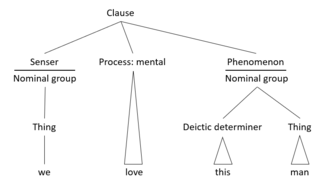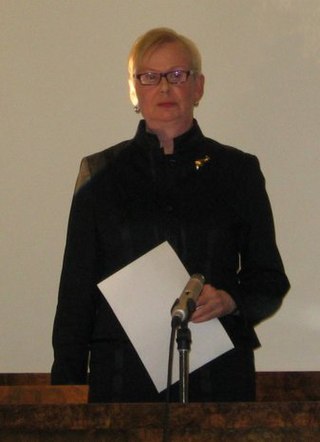Related Research Articles

Functional linguistics is an approach to the study of language characterized by taking systematically into account the speaker's and the hearer's side, and the communicative needs of the speaker and of the given language community. Linguistic functionalism spawned in the 1920s to 1930s from Ferdinand de Saussure's systematic structuralist approach to language (1916).
Transcription in the linguistic sense is the systematic representation of spoken language in written form. The source can either be utterances or preexisting text in another writing system.

Conversation analysis (CA) is an approach to the study of social interaction that empirically investigates the mechanisms by which humans achieve mutual understanding. It focuses on both verbal and non-verbal conduct, especially in situations of everyday life. CA originated as a sociological method, but has since spread to other fields. CA began with a focus on casual conversation, but its methods were subsequently adapted to embrace more task- and institution-centered interactions, such as those occurring in doctors' offices, courts, law enforcement, helplines, educational settings, and the mass media, and focus on multimodal and nonverbal activity in interaction, including gaze, body movement and gesture. As a consequence, the term conversation analysis has become something of a misnomer, but it has continued as a term for a distinctive and successful approach to the analysis of interactions. CA and ethnomethodology are sometimes considered one field and referred to as EMCA.
Kiezdeutsch is a variety of German spoken primarily by youth in urban spaces in which a high percentage of the population is multilingual and has an immigration background. Since the 1990s, Kiezdeutsch has come into the public eye as a multiethnic language.
John Local, BA, Ph.D., is a British phonetician and Emeritus Professor of Phonetics at the University of York. He was one of the creators of the experimental Yorktalk non-segmental speech synthesis system which employed techniques of Firthian Prosodic Analysis (FPA), an approach to phonology developed by J.R. Firth and members of the London School of linguistics. His book Doing Phonology written with John Kelly provides a radical contemporary take on FPA. Arising out of work which combined detailed phonetic analysis and Conversation Analysis his recent research has explored the interactional functioning of phonetic detail and phonetic variation in talk-in-interaction. According to Ford and Couper-Kuhlen (2004), Local's work 'has been seminal in founding a phonology for conversation. ... his studies have revealed dimensions of patterned sound production in talk-in-interaction hitherto unfathomed' (2004:13).

The Max Planck Institute for Psycholinguistics is a research institute located on the campus of Radboud University Nijmegen in Nijmegen, Gelderland, the Netherlands. The institute was founded in 1980 by Pim Levelt, and the institute is dedicated exclusively to psycholinguistics. Notably, it is also one of the few institutes of the Max Planck Society institutions situated outside Germany. According to the ranking of Web of World Research Centers, the Nijmegen-based institute ranks second among all Max Planck institutes In terms of visibility and eight in terms of size. Currently the institute employs approximately 235 people.
Stefan Th. Gries is (full) professor of linguistics in the Department of Linguistics at the University of California, Santa Barbara (UCSB), Honorary Liebig-Professor of the Justus-Liebig-Universität Giessen, and since 1 April 2018 also Chair of English Linguistics in the Department of English at the Justus-Liebig-Universität Giessen.

Auli Talvikki Hakulinen is a Finnish researcher and professor emerita of linguistics. She worked as professor of Finnish at the University of Helsinki from 1991 to 2006. From 2001 to 2004, she was an academy professor.
Wallace Chafe was an American linguist. He was Professor Emeritus and research professor at The University of California, Santa Barbara.
Sandra Annear Thompson is an American linguist specializing in discourse analysis, typology, and interactional linguistics. She is Professor Emerita of Linguistics at the University of California, Santa Barbara (UCSB). She has published numerous books, her research has appeared in many linguistics journals, and she serves on the editorial board of several prominent linguistics journals.
Interactional linguistics (IL) is an interdisciplinary approach to grammar and interaction in the field of linguistics, that applies the methods of Conversation Analysis to the study of linguistic structures, including syntax, phonetics, morphology, and so on. Interactional linguistics is based on the principle that linguistic structures and uses are formed through interaction and it aims at understanding how languages are shaped through interaction. The approach focuses on temporality, activity implication and embodiment in interaction. Interactional linguistics asks research questions such as "How are linguistic patterns shaped by interaction?" and "How do linguistic patterns themselves shape interaction?".
Interactional sociolinguistics is a subdiscipline of linguistics that uses discourse analysis to study how language users create meaning via social interaction. It is one of the ways in which linguists look at the intersections of human language and human society; other subfields that take this perspective are language planning, minority language studies, quantitative sociolinguistics, and sociohistorical linguistics, among others. Interactional sociolinguistics is a theoretical and methodological framework within the discipline of linguistic anthropology, which combines the methodology of linguistics with the cultural consideration of anthropology in order to understand how the use of language informs social and cultural interaction. Interactional sociolinguistics was founded by linguistic anthropologist John J. Gumperz. Topics that might benefit from an Interactional sociolinguistic analysis include: cross-cultural miscommunication, politeness, and framing.

Neal R. Norrick is a German linguist. He held the chair of English Linguistics at Saarland University in Saarbrücken, Germany, where he established a linguistics curriculum firmly based in pragmatics and discourse analysis. In the last two decades, he has become an important personality in linguistic pragmatics for his pioneering works on humor and narrative in conversational interaction.

Michael Hoey was a British linguist and Baines Professor of English Language. He lectured in applied linguistics in over 40 countries.
In linguistics, stance is the way in which speakers position themselves in relation to the ongoing interaction, in terms of evaluation, intentionality, epistemology or social relations. When a speaker describes an object in a way that expresses their attitude or relation to the object, the speaker is taking a stance. Stancetaking is viewed as a social action that shares the speaker's view of an object with their audience, sometimes inviting listeners to take their own stance as well.
Peter Auer is professor of Germanic Linguistics at the University of Freiburg in Freiburg im Breisgau, Germany. Auer graduated from the University of Constance in 1983. He worked at the University of Hamburg before going to Freiburg.
Anna-Brita Stenström [ˈanəˌbrit̬ə'st̬ɨnstɹɪm] was a Swedish linguist whose areas of research included corpus linguistics, sociolinguistics, pragmatics, and discourse analysis. She initiated and co-directed three online corpora of adolescent language: The Bergen Corpus of London Teenage Language (COLT), Ungdomsspråk och språkkontakt i Norden (UNO), and Corpus Oral de Lenguaje Adolescente (COLA).
Charles Goodwin was a UCLA distinguished research professor of communication and key member of UCLA’s Center for Language, Interaction and Culture. Goodwin contributed ground-breaking theory and research on social interaction and opened new pathways for research on eye gaze, storytelling, turn-taking and action.
Jeanette (Kohn) Gundel was an American linguist noted for her work on information structure and pragmatics.
Irene B. Vogel is an American linguist, specializing in phonology. She is a professor in the University of Delaware Linguistics and Cognitive Science Department, best known for her work on the phonology-syntax interface.
References
- 1 2 "Filosofisen tiedekunnan promootio 2017 - keväisten toivojen riemujuhla". University of Helsinki. Retrieved 3 August 2022.
- ↑ Selting, Margret (2010). "Prosody in Interaction: State of the Art". In Barth-Weingarten, Dagmar; Reber, Elisabeth; Selting, Margret (eds.). Prosody in Interaction. Studies in Discourse and Grammar. Vol. 23. Amsterdam: John Benjamins. pp. 3–40. doi:10.1075/sidag.23.05sel. ISBN 978-90-272-2633-4. ISSN 0928-8929.
- ↑ Drew, Paul (1999). "Review: Elizabeth Couper-Kuhlen & Margret Selting (eds.), Prosody in conversation: Interactional studies. Cambridge & New York: Cambridge University Press, 1996. Pp. xii, 471. Hb $74.95". Language in Society. 28 (1). Cambridge University Press: 103–107. doi:10.1017/s0047404599251044. ISSN 0047-4045. S2CID 145711680.
- ↑ Thompson, Sandra (2010). "Foreword". In Barth-Weingarten, Dagmar; Reber, Elisabeth; Selting, Margret (eds.). Prosody in Interaction. Studies in Discourse and Grammar. Amsterdam: John Benjamins. pp. ix–x. ISSN 0928-8929.
- ↑ Dash, Niladri Sekhar (11 June 2002). "LINGUIST List 13.1645: Discourse Analysis: Selting & Couper-Kuhlen". The LINGUIST List. Retrieved 3 August 2022.
- ↑ Williamson, Francesca A (2019). "Book review: Elizabeth Couper-Kuhlen and Margaret Selting, Interactional Linguistics: Studying Language in Social Interaction". Discourse Studies. 21 (4). SAGE Publications: 485–486. doi:10.1177/1461445619847786b. ISSN 1461-4456. S2CID 197699384.
- ↑ "Prof. Barbara Fox and colleagues win ISCA Best Book award". Department of Linguistics. University of Colorado Boulder. 2 November 2018. Retrieved 17 August 2022.
- ↑ "Research on Language and Social Interaction - Editorial board". Taylor & Francis. Retrieved 3 August 2022.
- ↑ Barth-Weingarten, Dagmar; Reber, Elisabeth (2009). "International conference "Prosody and Interaction": 15-17 September 2008, Potsdam University, Germany - Conference report" (PDF). Gesprächsforschung. 10: 118–130. ISSN 1617-1837.
- ↑ Barth-Weingarten, Dagmar; Reber, Elisabeth; Selting, Margret (2010). "Preface". In Barth-Weingarten, Dagmar; Reber, Elisabeth; Selting, Margret (eds.). Prosody in Interaction. Studies in Discourse and Grammar. Vol. 23. Amsterdam: John Benjamins. pp. xi–xviii. doi:10.1075/sidag.23. ISBN 978-90-272-2633-4. ISSN 0928-8929.
- ↑ Couper-Kuhlen, Elizabeth (1979). The prepositional passive in English. De Gruyter. doi:10.1515/9783111630724. ISBN 978-3-484-10363-4.
- ↑ Couper-Kuhlen, Elizabeth (1993). "English Speech Rhythm". Pragmatics & Beyond New Series. Vol. 25. Amsterdam: John Benjamins. doi:10.1075/pbns.25. ISBN 978-90-272-5037-7. ISSN 0922-842X.
- ↑ "Curriculum Vitae: Elizabeth Couper-Kuhlen" (PDF). University of Helsinki. Retrieved 3 August 2022.
- ↑ "Elizabeth Couper-Kuhlen". University of Helsinki. Retrieved 3 August 2022.